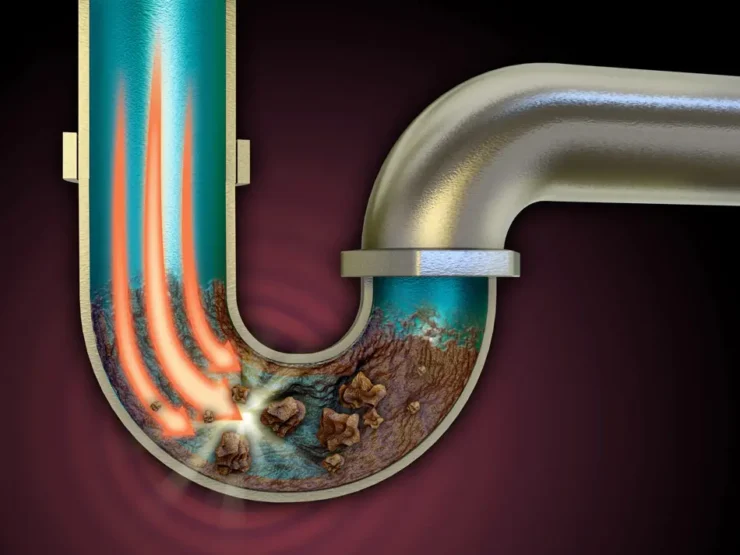Table of Contents
Blocked drains are one of life’s most annoying problems. One day everything is flowing smoothly, and the next day you’re standing ankle-deep in water while trying to take a shower. What’s worse is that the cause isn’t always obvious. Luck might make you think it’s a quick fix, but that rarely happens.
With that said, let’s face it – luck plays no part here. Skill, and knowing what to look for, are what count. Blocked drains come from many causes, and fixing them depends on the problem.
Key Points:
- Hair, food scraps, and grease are the most common causes of a blocked drain.
- Outdoor drains often get blocked by leaves and dirt.
- Tree roots are sneaky culprits that lead to serious drain blockages.
- A blocked drain can cause foul smells and water damage.
- Chemical drain cleaners aren’t always the best option for unblocking a drain.
1. Hair Everywhere
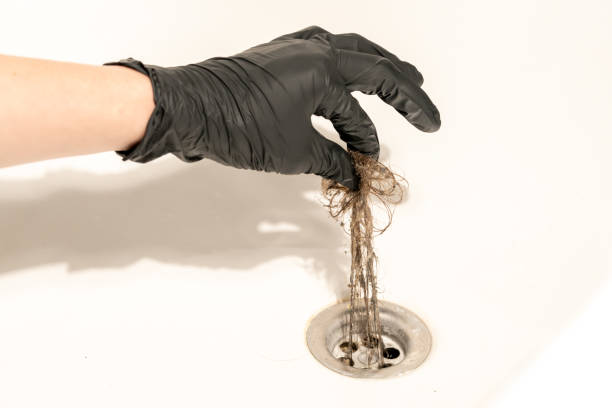
Hair is a big reason why your bathroom drains may become blocked. Long hair, short hair, any hair—once it goes down the drain, it clumps together, forming a tangled mess. If you wash your pet in the bath, you’re practically begging for a blockage. Lucky for you, fixing a hair blockage is simple. A basic drain snake can pull the hair out, and that usually solves the problem in minutes.
If you’re looking for experts to help when your blocked drain becomes too stubborn, Lucas Plumbing offers extensive experience in diagnosing and resolving blocked drains Adelaide base, quickly and effectively.
2. Grease Is Not Your Friend
You might think nothing of pouring leftover grease down the kitchen sink, but over time, it cools and hardens. The more grease you pour, the bigger the blockage becomes. A common mistake many people make is assuming hot water alone will wash it away. Sadly, that’s not the case. Hot water might push the grease further down, but it solidifies once it cools, leaving you with a blocked drain.
To fix it, try using boiling water and a mix of baking soda and vinegar. Let it sit for a few minutes, then flush it with more boiling water. Prevention, however, is better than the cure. Make it a habit to dispose of grease properly.
3. Foreign Objects
Kids are curious, and sometimes their curiosity leads to foreign objects going down the drain. Whether it’s toys, cotton buds, or bits of food, a drain isn’t the place for it. Even adults are guilty of this one. Accidentally dropping a bottle cap or a piece of jewelry can lead to big problems. Once the item gets lodged, it collects everything else that comes after it, forming a full blockage.
You’ll need a drain snake or plunger for most foreign objects. If the object is still close to the top, you may be able to pull it out with a bent wire hanger. Otherwise, it’s time to call a professional.
4. Tree Roots – The Silent Destroyers
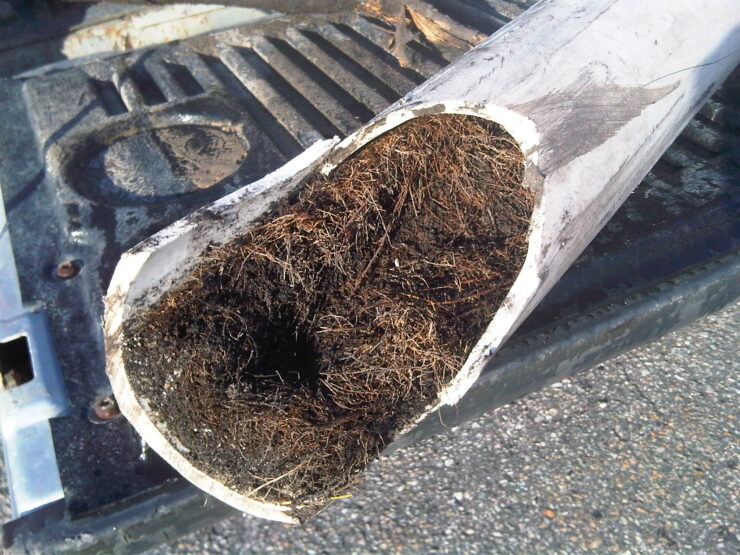
Tree roots are one of the biggest offenders when it comes to outdoor drains. Roots naturally grow toward water sources, and if there’s a tiny crack in the drainpipe, they’ll work their way in. Over time, the roots expand and can cause major blockages. This one isn’t something you can fix with a DIY solution. Tree root blockages require professional equipment, such as hydro-jetting or root cutting tools, to clear the drain.
Table: Common Blockage Causes and Solutions
| Cause | Typical Solution |
| Hair | Drain snake or hair remover tool |
| Grease | Boiling water, baking soda, and vinegar |
| Foreign objects | Drain snake, plunger, or wire hanger |
| Tree roots | Professional hydro-jetting |
5. Old Pipes
Older homes with old pipes often experience recurring blockages. Over time, pipes corrode and start to break down, leading to partial blockages that worsen as debris builds up. Sometimes, sections of the pipe might even collapse, causing full blockages. Replacing old pipes may be your only long-term fix if blockages keep happening. If your home falls into this category, calling a plumber to assess the state of your pipes is the best option.
6. Soap Scum Buildup
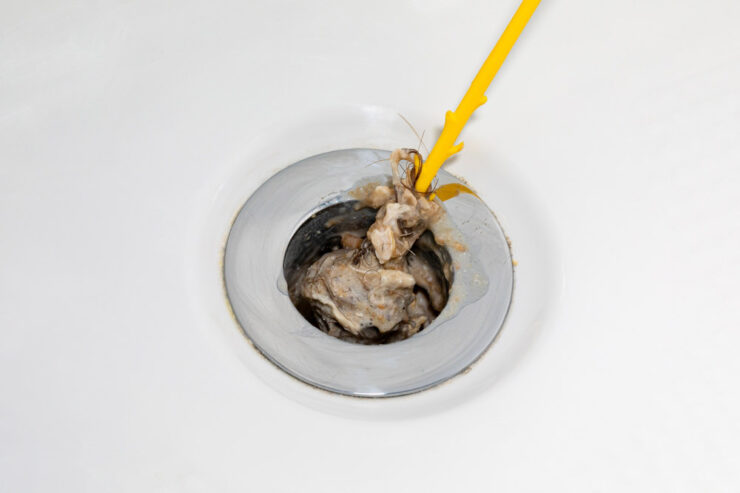
Soap scum is a silent culprit. Every time you wash your hands or take a shower, soap leaves a residue that eventually builds up inside the pipes. It’s not as noticeable as hair or food, but over time, soap scum can clog the drains. Fixing it requires a bit more than your average plunger. Try a mix of boiling water and vinegar to dissolve the soap scum, or use a plumber’s snake if the blockage is severe.
7. Too Much Toilet Paper
We’ve all been there, right? Someone in the household uses a little too much toilet paper, and suddenly the toilet refuses to flush. While toilet paper is designed to break down in water, too much at once can cause a blockage. To fix this, start by using a plunger. If that doesn’t work, a toilet auger might be needed to push the paper through.
8. Leaves and Outdoor Debris
Outdoor drains are at risk of becoming blocked by leaves, dirt, and other debris, especially during the autumn months. This debris can quickly build up in gutters and downspouts, leading to blocked outdoor drains. The easiest way to prevent outdoor blockages is by regularly cleaning gutters and installing mesh guards to catch leaves before they reach the drain.
9. Food Scraps
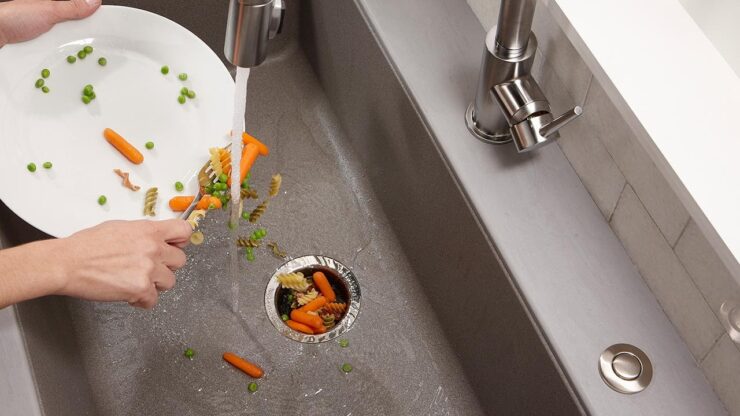
Many people assume that food waste is fine to go down the kitchen drain, especially if they have a garbage disposal. However, food scraps, especially starchy items like rice and pasta, expand when wet and can easily cause a blockage. Even worse, coffee grounds are notorious for clumping together and causing blockages.
Always dispose of food scraps in the trash rather than the sink. If you have a garbage disposal, make sure to run plenty of water while using it to help flush food particles through.
10. Faulty Installation
Sometimes, the problem isn’t what’s going down the drain, but how the pipes were installed. Incorrect installation can cause frequent blockages because the pipes don’t allow water to flow properly. You might notice slow drainage or recurring blockages that don’t seem to have a clear cause. A professional inspection can help you identify if faulty installation is the root of your blocked drains.
FAQ Section:
What can I do to prevent future blockages?
Regularly clean your drains and avoid disposing of grease, hair, and food scraps down the sink.
Can I use chemical cleaners to clear a blockage?
It’s better to avoid chemical cleaners, as they can damage your pipes in the long run. Stick to mechanical methods like plungers or drain snakes.
How often should I clean my drains?
Clean your drains once a month to prevent blockages, especially in high-use areas like the kitchen and bathroom.
Why do I keep getting blockages in the same spot?
You may have an underlying issue such as old pipes, tree roots, or improper installation. It’s best to consult a professional for recurring blockages.
Is it safe to flush wipes down the toilet?
No. Even “flushable” wipes can cause serious blockages and should be disposed of in the trash.
Final Thoughts
Blocked drains can be frustrating, but they don’t have to be a constant problem. Understanding what causes blockages and taking steps to prevent them will save you from dealing with nasty backups and potential water damage.
Remember, prevention is always the best approach when it comes to keeping your drains clear. If you’re dealing with a particularly stubborn blockage, or suspect a more serious issue like tree roots or faulty pipes, it’s best to call in the experts.

